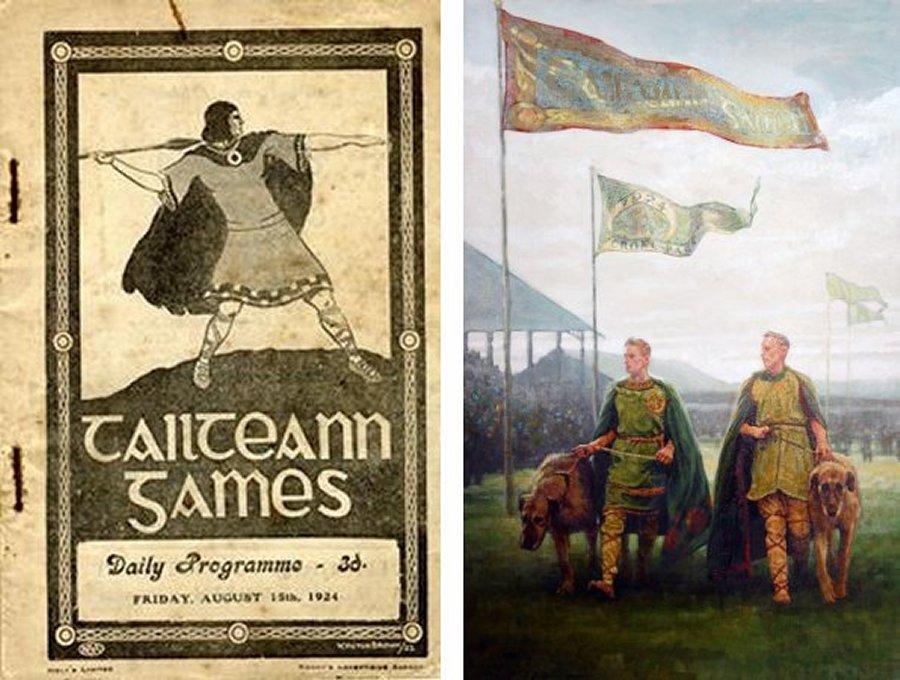
#15 Áenach Tailteann and Lughnasadh
Share
Tailtiu was the daughter of the king of Spain. She married Eochaid, of the Fir Bolg who became High King of Ireland when he overthrew Fodbgen. He was the first king to establish a system of justice in Ireland. During his reign no rain fell over the land, but there was dew and a harvest every year. Eochaid loved his wife so much that he named his capital after her (Teltown, County Meath). She became the foster mother of Lugh.
When Tailtiu died of exhaustion from clearing the plains of Ireland for agriculture, Lugh honoured her memory by establishing funeral games Áenach Tailteann, in her honour. This took place in the last two weeks of July and were followed with a celebration of the first harvest, Lughnasadh. These games were held continuously until c. 1169-1171 CE when the Normans invaded Ireland. They were revived in 1924.
During Áenach Tailteann, the dead were honoured, Brehon laws were proclaimed by the Druids, funeral games were played and there was entertainment. The honouring of the dead took place on the first three days. Guests attending would sing Guba (mourning chants) and then skilled Druids would improvise songs in memory of the dead (Cepógs). The dead would then be cremated on a funeral pyre. The Brehon laws were read to the guests by Bards and Druids and then another massive fire was lit. These were a celebration of life, though, and there was rejoicing after the funeral with the Cuiteach Fuait, games of both mental and physical ability.
Similar to the Olympics, games included the long jump, high jump, running, hurling, spear throwing, boxing, sword fighting, archery, wrestling, swimming, and horse drawn chariot racing. For the more intellectual and artistic there were also included competitions in strategy, singing, dancing and story-telling. There were also skilled crafts competitions for jewellery makers, weavers and armourers.
Young couples who met for the first time would have a handfasting. This was a temporary marriage that lasted up to a year and a day. During that time couples were free to separate, or then make a permanent bond.
At the end of the two weeks Lughnasadh would be celebrated. There was an offering of the first fruits to the Gods, a harvest feast, a bull was sacrificed, a ritual play was danced portraying Lugh providing a harvest for mankind. Afterward the feast people would climb up hills and mountains.
When Tailtiu died of exhaustion from clearing the plains of Ireland for agriculture, Lugh honoured her memory by establishing funeral games Áenach Tailteann, in her honour. This took place in the last two weeks of July and were followed with a celebration of the first harvest, Lughnasadh. These games were held continuously until c. 1169-1171 CE when the Normans invaded Ireland. They were revived in 1924.
During Áenach Tailteann, the dead were honoured, Brehon laws were proclaimed by the Druids, funeral games were played and there was entertainment. The honouring of the dead took place on the first three days. Guests attending would sing Guba (mourning chants) and then skilled Druids would improvise songs in memory of the dead (Cepógs). The dead would then be cremated on a funeral pyre. The Brehon laws were read to the guests by Bards and Druids and then another massive fire was lit. These were a celebration of life, though, and there was rejoicing after the funeral with the Cuiteach Fuait, games of both mental and physical ability.
Similar to the Olympics, games included the long jump, high jump, running, hurling, spear throwing, boxing, sword fighting, archery, wrestling, swimming, and horse drawn chariot racing. For the more intellectual and artistic there were also included competitions in strategy, singing, dancing and story-telling. There were also skilled crafts competitions for jewellery makers, weavers and armourers.
Young couples who met for the first time would have a handfasting. This was a temporary marriage that lasted up to a year and a day. During that time couples were free to separate, or then make a permanent bond.
At the end of the two weeks Lughnasadh would be celebrated. There was an offering of the first fruits to the Gods, a harvest feast, a bull was sacrificed, a ritual play was danced portraying Lugh providing a harvest for mankind. Afterward the feast people would climb up hills and mountains.
